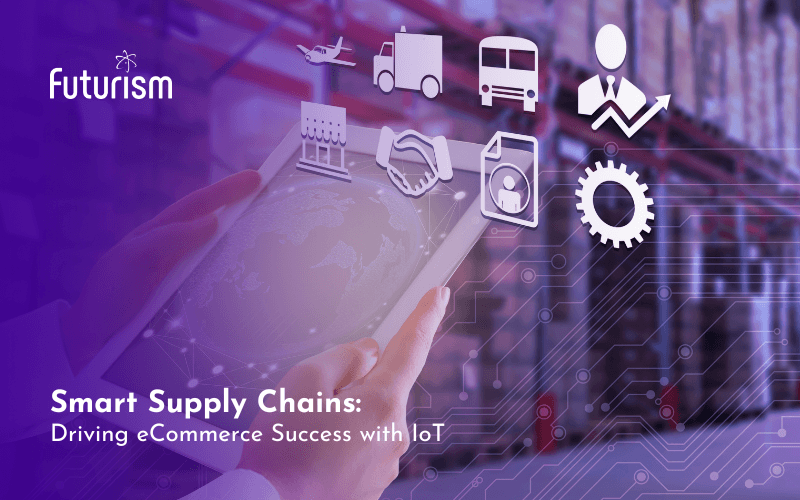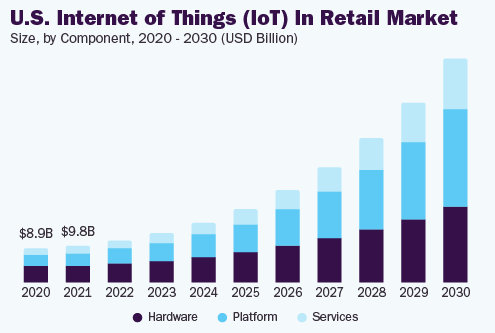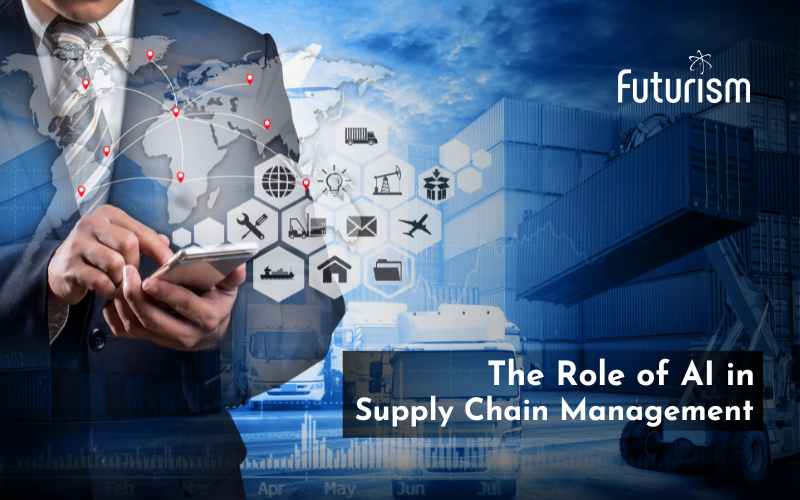Smart Supply Chains: Driving eCommerce Success with IoT

Futurism Technologies
March 27, 2024 - 2.2K
5 Min Read
In today’s digital world, a seamless and transparent supply chain is essential. Consumers demand fast deliveries and reliability, necessitating crystal-clear visibility. Enter the Internet of Things (IoT), a transformative technology offering real-time tracking, smart warehouse management, and data-driven insights to optimize supply chains for eCommerce success.

The Supply Chain Revolution
Supply chain management has undergone remarkable changes over the past few decades. Initially focused on optimizing individual elements of supply and distribution, digital technology’s advent shifted the focus to end-to-end efficiency and transparency. The eCommerce boom, introducing complexities and demanding operational agility, rendered traditional methods obsolete. This paved the way for advanced technological solutions for modern supply chain management operations.
IoT’s Influence
IoT marks a significant milestone in supply chain evolution, enabling seamless connectivity and data exchange across its elements. This integration shifts from a linear approach to a transparent system, crucial for modern eCommerce’s dynamic demands. With real-time data, businesses anticipate challenges, optimize operations, and enhance customer satisfaction. IoT devices, from smart warehouse sensors to GPS and RFID tags in transportation, provide live updates and analytics for informed decision-making.
IoT devices can be deployed across various stages of the supply chain. For instance, sensors placed in warehouses provide real-time data on inventory levels, environmental conditions, and equipment status which is collectively known as IoT-powered smart warehouse management. In transportation, GPS and RFID tags track the location and condition of goods in transit, offering live updates and alerting managers to any potential delays or issues.
Read also: IoT-Powered Smart Warehouse Management: A Detailed Guide
The true power of IoT lies in its ability to collect vast amounts of data from these diverse sources. This data, when analyzed, offers invaluable insights into every aspect of the supply chain. It enables businesses to identify patterns, predict trends, and make informed decisions. For eCommerce businesses, this means the innate ability to manage inventory more efficiently, optimize routing and logistics, and enhance overall customer satisfaction by ensuring timely deliveries and maintaining product quality.
Furthermore, IoT facilitates a more proactive approach to supply chain management. By monitoring equipment and vehicle health, it allows for predictive maintenance, reducing downtime and avoiding costly disruptions. This proactive stance is crucial in an industry where even minor delays can have significant backlash on customer trust and business reputation.
Benefits of IoT in Supply Chain
- The implementation of IoT in supply chains brings a host of benefits, fundamentally changing how businesses operate and interact with customers. One of the primary advantages is enhanced transparency. Real-time tracking of goods provides stores and customers alike with up-to-date information on the whereabouts and status of shipments. This level of transparency is vital in building trust and ensuring customer satisfaction in the eCommerce industry.
- Improved efficiency is another significant benefit. IoT-enabled smart asset condition monitoring and automation in warehousing operations, such as inventory management and order picking, streamlines processes and reduces manual errors. In logistics, IoT helps to optimize routes and delivery schedules, ensuring faster and cost-effective shipping.
- IoT also plays a critical role in risk management. By providing continuous monitoring and data analytics, it helps in identifying potential issues before they escalate. Whether it’s a delay due to traffic congestion or a temperature-sensitive shipment at risk of spoilage, IoT enables quick response and resolution, thereby mitigating risks and reducing losses.
- Additionally, IoT also contributes to sustainability in supply chain operations. By optimizing routes and reducing idle time for vehicles, it lowers fuel consumption and emissions. In warehouses, IoT sensors help in efficiently managing energy use, further contributing to eco-friendly practices.
Read also: Digital Transformation and Sustainability in 2024 and Beyond
- The synergy of Artificial Intelligence (AI) with IoT takes supply chain visibility to an unprecedented level. AI and ML algorithms analyze the vast amounts of data generated by IoT devices, extracting actionable insights and facilitating smarter decision-making.
Read also: How AIoT is Reshaping the Digital World?
- AI-driven predictive analytics is a key area where this integration shines. By analyzing historical data and identifying patterns, AI can predict future trends and potential disruptions in the supply chain. This foresight allows businesses to proactively adjust their strategies, be it in inventory management, demand forecasting, or maintenance scheduling.
- Automated decision-making is another crucial benefit. AI algorithms can make real-time decisions based on IoT data, such as rerouting shipments to avoid delays or automatically adjusting inventory levels. This level of automation not only enhances efficiency but also reduces the burden on human managers, allowing them to focus on more strategic tasks.
- Advanced AI-powered data analytics also leads to more personalized customer experiences. By understanding customer behavior and preferences, businesses can tailor their services, such as customized delivery options or personalized product recommendations, enhancing customer engagement and loyalty.
- The integration of AI/ML with IoT also facilitates continuous improvement in supply chain operations. Machine learning algorithms continually learn from new data, leading to progressively smarter and more efficient supply chain solutions. This ongoing improvement is vital for staying competitive in this continually demanding eCommerce landscape.
Read also: How AI is Leveling Up Customer Experience with eCommerce Personalization?
Summary
The integration of IoT in supply chain management, especially when combined with AI/ML technologies, offers tremendous benefits to eCommerce businesses. It enhances visibility, improves efficiency, and enables proactive risk management, ultimately leading to greater customer satisfaction and business success.
At Futurism Technologies, we are pioneering next-gen IoT solutions, helping enterprises embrace the power of IoT and AI in a seamless and painless manner. Unleash data-driven and intelligent supply chain with the power of IoT and AI with us.
Subscribe Now!
TRENDING POSTS
-
Futurism Returns to Hannover Messe 2024: Leading the Charge in Industrial and Digital Transformation
-
The Role of Smart Maritime IoT Solutions in Enhancing Maritime Safety
-
Data Integration Unlocked: From Silos to Strategy for Competitive Success
-
Navigating the Shadows: Understanding Zero-Click Attacks in the Digital Age
-
AI Reimagined: Crafting Next-Gen AI Apps with Expert Fine-Tuning
-
Explore Next-Gen Digital Solutions with Futurism at MWC 2024
-
Futurism Unleashes the Technology of Tomorrow at MWC Barcelona 2024
-
Futurism AI: Turning Ideas into Apps at Lightning-Fast Speed
-
Accelerate AI Across Your Enterprise With Futurism AI
-
Futurism to Address the Biggest Security Challenges at RSS 2022
-
Futurism at SelectUSA 2022: Steering the Next Wave of Businesses
-
Futurism to Uplift the MSP Business Community at the MSP Expo 2022
-
Futurism Sets Out to Address the Biggest Security Challenges at the RSA Conference 2022
-
5 Ways to Prepare Your Business for Digital Transformation
-
4 Ways To Win at Digital Transformation on a Shoestring Budget
-
Futurism: Empowering MSPs at the Channel Partners Conference & Expo 2022
-
Why AI in Digital Marketing is the Next Big Thing?
-
Futurism brings ‘Mobile First Digital Transformation’ to the fore at MWC Barcelona 2022
-
Cybersecurity for Rural Hospitals: How can Rural Hospitals become Cyber Smart?
-
Futurism Empowers Rural Health Care Community at the AHA Rural Health Care Leadership Conference
-
The Biggest Problem With Cybersecurity In Healthcare Sector, And How IBM QRadar Can Fix It?
-
How IBM MaaS360 is Revolutionizing Endpoint Security in the Healthcare Industry?
-
Futurism to Present its MSP Partner Program at the Channel Partners Conference & Expo 2021
-
EndPoint Security in Healthcare Matters and IBM MaaS360 Can Help
-
How AI Will Enable Faster Adaptation of Digital Transformation
-
How Is Digital Modernization Important In Supplier On-Boarding?
-
Top 10 Email Marketing Tips for This Holiday Season
-
Benefits of using ERP Software for Energy and Gas Industries

